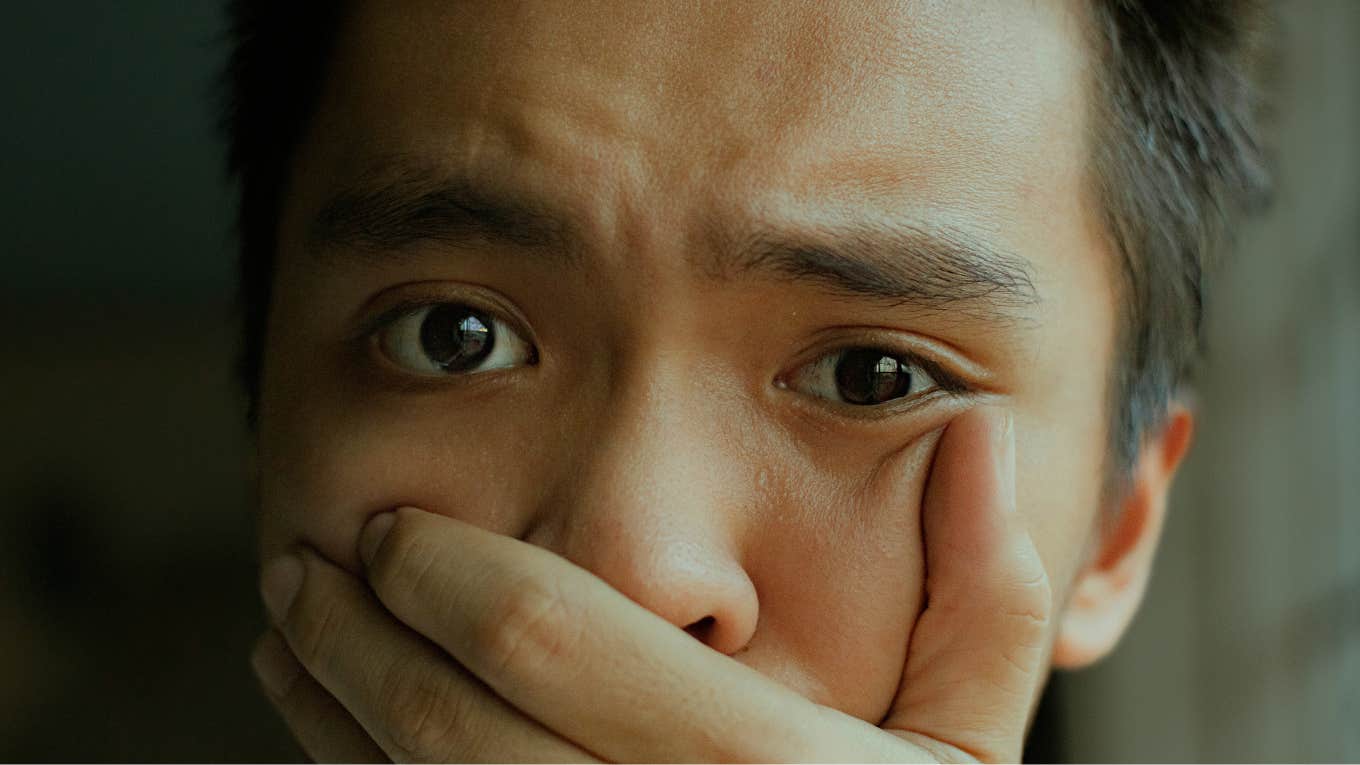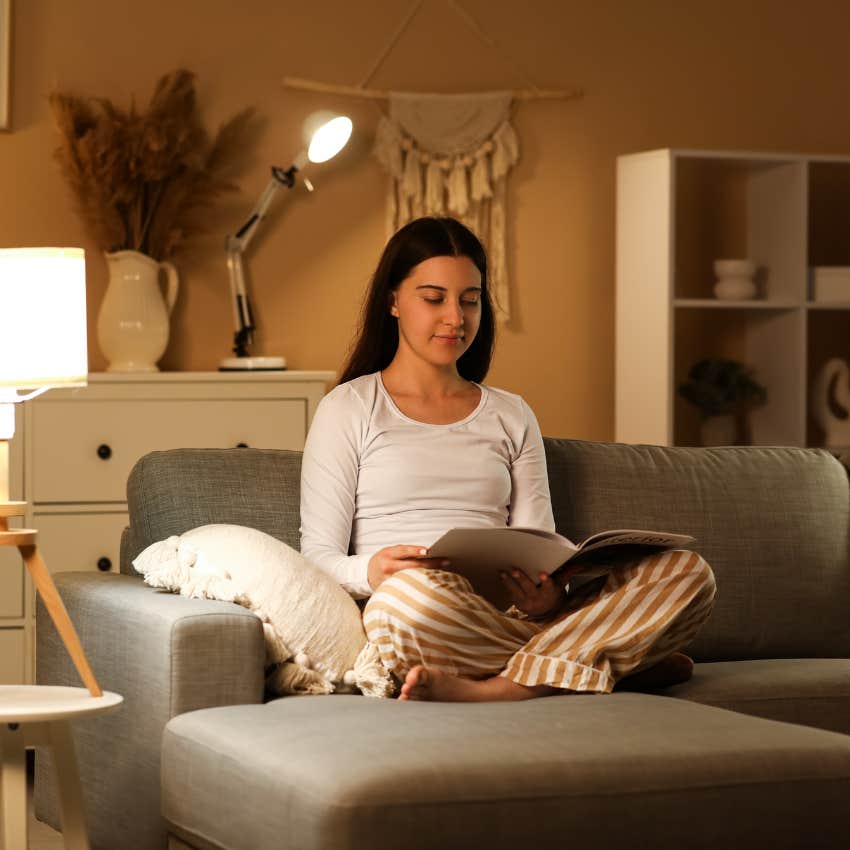The Anxiety Hacks 23 Experts Use On Themselves — That Don’t Involve Medication
Healing professionals share non-medicinal tips to manage anxiety and stress.
 Nothing Ahead | Canva
Nothing Ahead | Canva In 2020, the World Health Organization released a scientific brief that reported a 25 percent increase in the prevalence of anxiety and depression worldwide. So, it's not just you. The world is more stressful, and anxiety is on the rise. According to the WHO's brief, young people and women were hit hardest. Social isolation was considered a major factor, as were loneliness and exhaustion.
A recent randomized clinical trial published by The Journal of the American Medical Association sought to determine whether performing mindful meditation for anxiety was as effective as a popular anti-anxiety medication, escitalopram, which helps regulate the levels of anxiety-reducing serotonin produced by the body. Its conclusion: Outcomes were similar for both medicinal and non-medicinal treatment methods.
The Cleveland Clinic recommends several non-medicinal methods to increase the body's production of serotonin, including eating foods with tryptophan, getting more sunlight, exercising regularly and taking steps to reduce your stress level.
We asked our deep roster of YourTango Experts, healing and wellness professionals, to share their top non-medicinal tips for managing stress and anxiety. Here are their responses.
Here are the anxiety hacks experts use on themselves that don’t involve medication:
1. Remember to breathe
When you are anxious and stressed your breathing becomes rapid and shallow. This causes you to be oxygen deprived, which only makes your body feel more anxious.
The quickest way to reduce stress-related anxiety is to slow down and deepen your breathing. Inhale for a count of four, hold the inhale for a count of four and exhale deeply for a count of six.
—Kimberly LaFollette, clinical psychologist
2. Count your blessings
 insta_photos / Shutterstock
insta_photos / Shutterstock
Stay focused on all that is positive. Focus on your blessings. Find your gratitude.
—Kathy Lynn Thielen, spiritual intuitive & medium
3. Exercise
Stress — the need to fight off a tiger or run away from it — needs to be expressed and released from the body. Physical activity in any form — walking, running, swimming, jumping rope, using a hula hoop, kickboxing — whatever will help release the hold stress has on you and give you time and energy to think so you can problem solve and be compassionate with yourself.
—Judith Pinto, attention, focus, and productivity coach
4. Ask for help
One of the best things you can do is to focus on your breathing. Taking slow, deep breaths can help to calm your nervous system and ease anxiety symptoms. Additionally, spending time in nature can also be helpful. Studies have shown that exposure to green space can reduce stress levels and improve mood.
Furthermore, exercise is another excellent way to relieve stress and anxiety. Just 30 minutes of moderate exercise can also help to alleviate symptoms and improve well-being. If you're struggling to cope with stress on your own, don't hesitate to seek professional help.
—Clare Waismann, founder, the Waismann Method
5. Find your personal anti-anxiety prescription
No two people are alike. What one person finds soothing or comforting doesn't necessarily work for someone else. Ask yourself, "When I have felt anxious in the past, what has helped to relax me?"
For some, it's exercise, talking to friends, getting involved in an enjoyable project, making to-do lists, connecting with family, journaling, meditating, doing yoga, and so on. Make a go-to list of actions you can take when life feels overwhelming, and then, whether you feel like it or not, do it! Force yourself if you have to.
—Michelle Weiner-Davis, author and founder, the Divorce Busting Center
6. Quiet your mind
The easiest and cheapest way to calm anxiety is to move. Take a walk; the deeper, the better, but it is not required. It deepens your breath, changes the scenery, distracts you, allows your unconscious to process what is happening, and also discharges the stress in your body. Find some way to move and quiet your mind.
—Merle James Yost, licensed marriage and family therapist
7. Relax tense muscles
This is a process that is backed by research. The steps are simple. Remembering to do it is the hard part. First, notice that you are stressed. A clue is that you have involuntarily tense muscles. Scan your body from head to toe and notice which areas are tense. (I tend to tense my shoulders and abdomen.)
Second, ask yourself this question: Am I safe right now? (Hint: you might say no due to past events or future possible outcomes. Unless someone is physically threatening you right now, the answer is yes. If they are, stop reading this article and get safe immediately.)
Third, relax the tense muscles. Pretend you are a wet noodle and just let them go. Finally, go forth in your now-regulated body.
—Tara Brown, CEO and consultant
8. Walk outside
Take a brisk walk in nature. If that's not possible, walking anywhere or on a treadmill works too; just get your body moving. This will help you to process your emotions and release anxiety. I also highly recommend journaling and Emotional Freedom Technique (EFT) tapping.
—Erin S. Moore, intuitive healer & health coach
9. Shift your energy
This simple 3-step process you can do "in the moment", which only takes a minute or two, will soothe your nervous system and help you shift out of the "fight-flight" stress response, into a more relaxed state.
First, focus on your breathing, and allow your breath to slow. Breathe in for a count of five and out for a count of seven. This signals your nervous system that you are safe and allows a shift into more relaxation.
Second, as you relax, focus your attention on your heart. Imagine that your breath is coming into and flowing out of your heart. Doing this for a minute or so helps create more "coherence" in your mind and nervous system.
Third, from this more relaxed state, ask yourself, what is one small, super-achievable action I can take, in this moment? And do it. The action doesn't need to have anything to do with what is causing your stress — simply by moving into action, you are shifting your energy.
—Anna McKinlay, lifestyle business breakthrough specialist
10. Train your mind to rise above problems
When Einstein stated that "You never solve a problem from the same mind that created the problem," he meant to lift your mind to a higher, lighter vibrational level. Meditation is a great way to do that. In the meantime, breathe deeply, move into the natural rhythm of nature, listen to soothing music, dance, walk, sing and laugh. These are all stress relievers.
—Jean Walters, coach, teacher, mediator
11. Think short-term
An overabundance of stress emerges when plans and commitments are disrupted. When feeling stressed, stop what you are doing and plan out your next 48 hours.
Literally, everything you wish and need to do in order of how you wish to do them. Fill your calendar completely. Include the things like yoga, meditation, and exercise of this is what you would normally do. Plan your activities from the time you awake to the time you go to bed.
Follow your plan diligently. It's your plan and no one else's. After 48 hours (and along the way), check in and see how you feel. You are now dancing beautifully with the complexity of your world.
—Larry Michel, relationship restoration coach
12. Practice brain breathing
"Brain-breathing" takes three minutes to learn and two minutes to bring yourself to greater peace. The more you practice this, the faster and more effectively you can create peace, as it is based on yogic breathing and neuroscience. This is the No. 1 skill that I recommend to people who find themselves regularly triggered to worry and who need peace.
—Susan Allan, CEO, the Marriage Forum Inc.
13. Challenge your perceptions
First, notice your thoughts during a stressful situation. How are you interpreting the situation? How does this make you feel?
Next, challenge your thoughts. Why are you interpreting the situation in this way? Is your interpretation realistic? Is your interpretation based on a similar experience or fact?
Then, create an alternative, realistic viewpoint. What is your new realistic interpretation of the stressful situation? How does this make you feel? Finally, build a habit of reframing your perception of stressful situations to soothe stress-related anxiety.
—Catherine Wood, wellness coach
14. Take a warm bath
Take a "time-out" by relaxing in a nice warm bath with a good magazine.
—Rev. Ellyn Kravette, spiritual guide
15. Tell yourself, 'I love you'
To soothe your stress, wrap your arms around your body, crossing them over your Heart Chakra and saying, "I love you" to yourself as you gently rock back and forth. Close your eyes and visualize yourself in a peaceful and safe place that makes you feel relaxed and joyful.
—Dr. Ava Cadell, certified love coach
16. Shake yourself
Shake it up! I mean, let your body shake the stress out. Let it tremble, move, vibrate, push away, or forward. It goes from TRE (Trauma Release Exercise), to dancing or sitting on a medicine ball to bounce up and down. The idea is to allow your body to let go of the accumulated tension.
—Dr. Fabienne Slama, core emotional awakener
17. Seek counseling
Stronger than medication is mediation, and even better than mediation is meditation.
If you want to soothe stress-related anxiety, then try talking. Communicate with whoever and whatever is causing you stress that is leading to your anxiety. Working with a healer or a therapist, or a coach is a great way to soothe your stress and relieve your anxiety.
And if you want to take it one step further, because prevention is better than a cure. Meditate! The particular meditation that helps with stress reduction is called Metta Meditation. Metta means loving kindness, or loving friendliness, or benevolent goodwill.
The simple words “I am well, happy,y and peaceful” repeated with each inhalation for five minutes will help you feel happy and peaceful.
—Keya Murthy, MS, clinical hypnotherapist and spiritual life coach
18. Make a personal music therapy plan
Relief from stress-related anxiety without medications and side effects is possible with Personalized Music Therapy. The evidence-based therapy is used globally for multiple mental health benefits. From calming the nervous system, stabilizing blood pressure, and relaxing muscle tension — it's the most comforting method to hold your horses when your fight or flight response goes berserk.
Upbeat music of any form can provide short-term benefits. But personalized music therapy can provide long-term capacity to deal with and manage stress-induced anxiety.
When music therapy is personalized as per your individual needs, problems, desires, date of birth, and name, it facilitates the release of the feel-good hormones "endorphins" and "oxytocin" while controlling the levels of the stress hormone "cortisol."
Personalized Music Therapy consists of specific music frequencies, binaural beats, soothing tunes, and powerful affirmations, the amalgamation of which works to beat mental health issues like stress, anxiety, and depression.
—Sidhharrth S. Kumaar, founder, Numrovani
19. Practice healthy anger movement
I have never taken medication for my anxiety as I am all about coming back to the body and nature to soothe, heal, and restore. One of the biggest soothers that I rely on in my practice and have shared with countless clients through the years is the art of healthy anger movement.
You may wonder what I mean by this, and I want to focus on the word "healthy" here. Anger pushed down in the body stores up and creates stress and anxiety. It will bleed over into panic, fear, and depression, and can manifest in many other forms.
As a society we are not very accepting of what we deem a negative emotion such as anger. However, all emotions are healthy if we learn how to feel them and move them in such a fashion.
As humans, we were designed not to squish down our emotions but to feel the entire rainbow of them — that's why I encourage and practice the movement of anger to help self-soothe my stress and anxiety (giving myself permission to scream and throw a tantrum, you could say). However, I do it through conscious practices such as boxing, batting cages, and stretching routines that move the upper body in the fashion that you would move if you were in a fight.
I encourage people to make use of "rage rooms" where you get to go and smash things to the tunes of your choice for an hour in the safety of a space designed just for it.
If you cannot do these things, throw yourself down on the bed or floor and shake, scream, and pound on a pillow. Anxiety and stress lock up in our joints and micro-tissues, creating the sensations that we are all familiar with when we think about stress or anxiety. So, give yourself permission to get moving and be physical, in a health-conscious way.
—Rene Schooler, intimacy and relationship coach
20. Spend more time doing things you enjoy
 Pixel-Shot / Shutterstock
Pixel-Shot / Shutterstock
Examine the ratio between the time you've recently spent doing work or meeting responsibilities vs. the time you've spent doing enjoyable or restorative activities. When that ratio gets skewed too far toward work, our stress levels increase. Sometimes the simplest fix for stress involves making some changes to how we're spending our time.
—Paul Greene, Ph.D., Director of the Manhattan Center for Cognitive-Behavior Therapy
21. Release self-judgment
Step out of the situation that is causing you anxiety for a bit, both literally and figuratively. I like to take a walk in nature so I can ground myself more, realize that everything is fine, and work off some of the cortisol in my body.
While you walk, imagine yourself stepping into the story you've been telling yourself about the situation, and imagine yourself changing it or stepping out of it entirely, letting go of any self-judgment. If we realize life is a story we've made up, and that we have a choice to keep it or release it, it can lend loads of perspective that decreases anxiety. And the walk will help, too.
—Kathryn Ramsperger, certified life coach, author
22. Let your brain play
Anxiety often reflects internal or external factors that have not yet been integrated into your larger understanding. Take a breath (or 20) and isolate a word, phrase, or factor that is the source of anxiety right now.
Then do a special activity that has nothing to do with the problem or your to-do list. This might be completing a puzzle, doodling, reading a poem or drawing a Tarot card.
When your brain has a chance to play, relief through active rest will come to you, as well as a meaningful realization that will help to integrate the rogue source of anxiety.
—Cyndera Quackenbush, author, healer, intuitive card reader
23. Focus on something worthwhile you've avoided
Take the one safe, healthy action as simply and authentically as possible that relates to the source of your stress-related anxiety. For example, give 10 minutes to one worthwhile matter you’ve been avoiding.
—Ruth Schimel, Ph.D., career and life management consultant
Carter Gaddis is a writer and editor who spent 24 years as an award-winning sportswriter for newspapers in Florida and for various online publications, including ESPN, Parenting Magazine, and the St. Petersburg Times.

